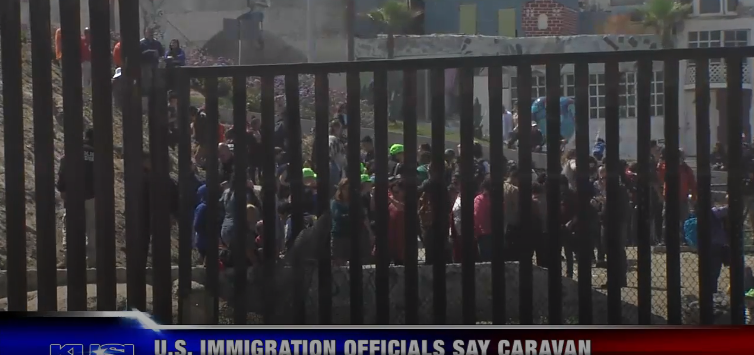A group of Central Americans who journeyed to the U.S. border in a caravan resolved to turn themselves in and ask for asylum Sunday in a direct challenge to the Trump administration — only to have U.S. immigration officials announce that the San Diego crossing was already at capacity and wouldn’t immediately be accepting them.
Nearly 200 migrants, many traveling with children, had decided to apply for protection at the crossing at San Diego, organizers said.
But even before the migrants arrived, the U.S. Customs and Border Protection said the crossing can take in additional people only as space and resources become available. The agency has said the port can hold about 300 people temporarily.
The migrants made their way northward by foot, freight train and bus over the past month, many of them saying they feared for their lives in their home countries.
The Trump administration has been tracking the caravan, calling it a threat to the United States since it started in Mexico on March 25 near the Guatemala border. Attorney General Jeff Sessions has called the caravan “a deliberate attempt to undermine our laws and overwhelm our system.”
Aministration officials have railed against what they call America’s “catch and release” policies that allow people requesting asylum to be released from custody into the U.S. while their claims make their way through the courts, a process that can last a year.
Earlier Sunday, the migrants boarded five old school buses to attend a rally at a Pacific Ocean beach, with supporters gathering on both sides of the border fence and some climbing the barrier to sit or to wave signs.
Wendi Yaneri Garcia said she is confident she will be released while her asylum case wends its way through the courts because she is traveling alone with her 2-year-old son, who has been sick.
“All I want is a place where I can work and raise my son,” the 36-year-old said.
She said that police in her hometown of Atlantida, Honduras, jailed her for protesting construction of a hydroelectric plant and that she received death threats after being released.
Nefi Hernandez, 24, said a gang in his hometown of San Pedro Sula, Honduras, threatened to kill him and his family if he did not sell drugs. He intended to seek asylum with his wife and baby daughter, who was born on the journey through Mexico.
Jose Cazares, 31, said he faced death threats in the Honduran city of Yoro because a gang member suspected of killing the mother of his children learned one of his sons reported the crime to police.
The travelers face an uncertain future if they ask for asylum. U.S. immigration lawyers warned them that they face possible separation from their children and detention for many months.
Homeland Security Secretary Kirstjen Nielsen said asylum claims will be resolved “efficiently and expeditiously.” But she warned that any asylum seekers making false claims could be prosecuted, as could anyone who assists the migrants in doing so.
Administration officials and their allies claim that asylum fraud is growing and that many who seek it are coached on how to do so.
Asylum seekers are typically held for up to three days at the border and then turned over to U.S. Immigration and Customs Enforcement. If they pass an asylum officer’s initial screening, they may be detained or released into the U.S. with ankle monitors.
Maria de Los Angeles, 17, said she felt confident after speaking with an attorney that U.S. authorities would release her while her case wends its way through the courts because she was traveling alone with her 1-year-old son. She hoped to move in with a sister in San Francisco.
“I’m fired up to go because I believe in God and I believe everything will work out,” she said.
She said she fled her home in Jutiapa, Honduras, because the father of her son threatened to kill her and their child.










